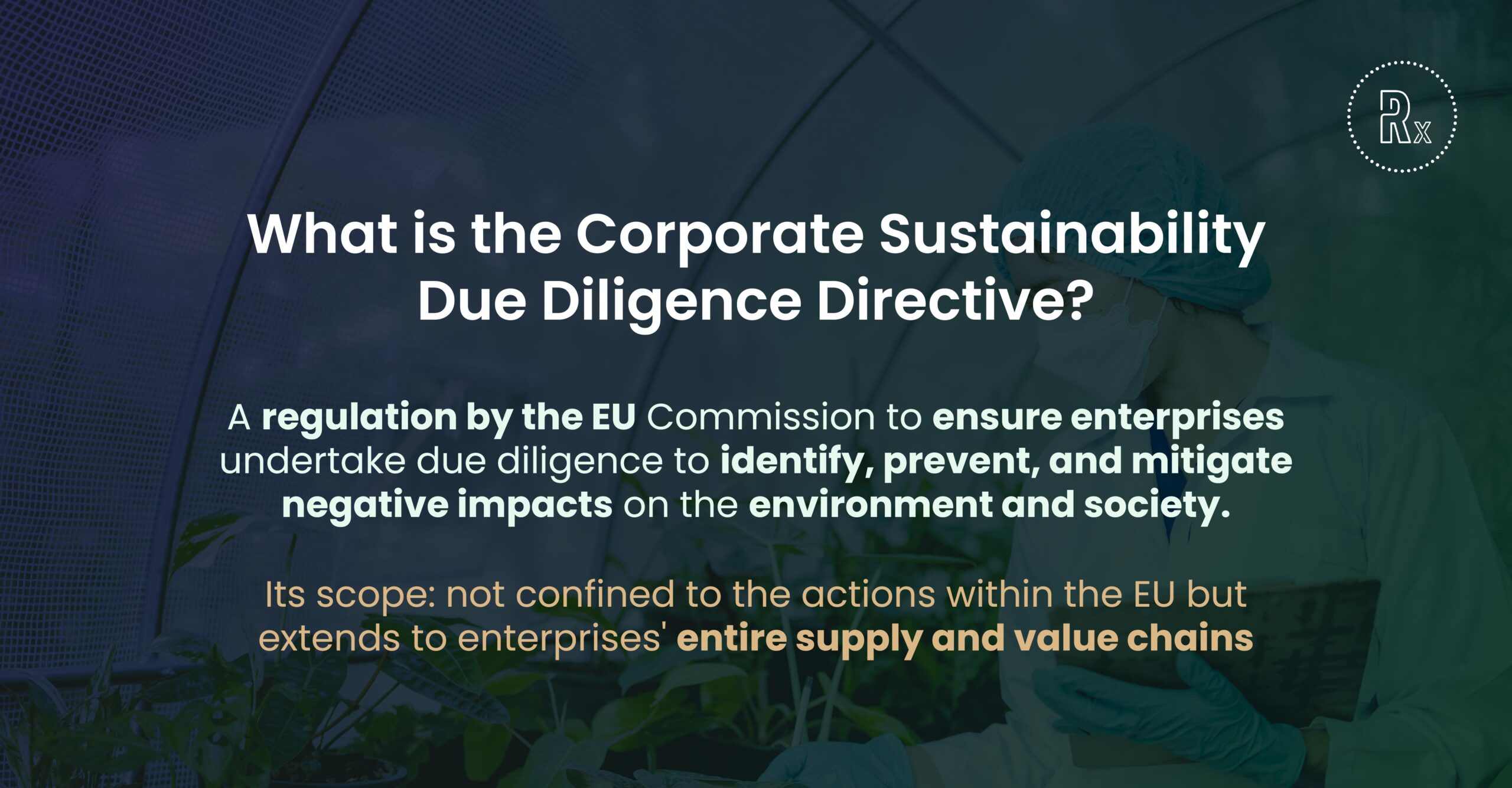The Corporate Sustainability Due Diligence Directive, introduced in February 2022, is a testament to the European Union’s commitment to reshaping how companies approach their environmental and social responsibilities.
With consequences ranging from penalties to civil liability, large companies, especially those with more than 1,000 employees, are under the spotlight to ensure compliance
9 key things to know about the Corporate Sustainability Due Diligence Directive
1. Definition and scope
The Corporate Sustainability Due Diligence Directive is a groundbreaking regulation introduced by the European Commission aimed at ensuring that large enterprises undertake due diligence processes to identify, prevent, and mitigate potential adverse impacts on the environment and society.
The scope of this directive is vast. It’s not merely confined to the actions of the companies within the EU but extends to their entire supply and value chains, including subcontractors and suppliers globally. This holistic approach emphasizes the duty of care that companies owe to people and the planet, ensuring sustainability isn’t confined to regional borders.

2. Applicable industries
While the directive has a broad reach, it’s particularly significant for specific sectors that have historically had notable environmental and societal footprints. These include industries such as:
- Mining and metallurgy
- Oil and gas extraction
- Agri-food production.
- Apparel and textiles, often grapple with challenges in supply chain transparency.
- Electronics and tech, given the vast supply chains that span continents.
- Large-scale construction and infrastructure projects.
However, it’s worth noting that any company with more than 1,000 employees falls under this directive’s ambit, regardless of the financial sector in which it operates.
3. Primary objectives
The directive’s overarching goals are manifold:
- Promote corporate accountability: Ensure that large companies operating in the EU are accountable for their environmental and human rights impacts, both within the region and globally.
- Protect stakeholders: Safeguard the rights of stakeholders, including workers, communities, and consumers, from potential negative impacts of corporate activities.
- Enhance transparency: Make certain that businesses are transparent about their due diligence processes, outcomes, and the steps they are taking to mitigate risks.
- Drive sustainable supply chains: Push companies to look beyond their immediate operations and ensure that sustainability standards are upheld throughout their supply chains.
4. Environmental and social risks
This directive recognizes that businesses can pose significant environmental and social risks, both directly and indirectly:
- Environmental risks: These include pollution, deforestation, loss of biodiversity, and excessive water use, among others. For instance, the EU deforestation regulations were launched to ensure that commodities production and imports into the EU do not contribute to global deforestation.
- Social risks: Challenges related to labor rights (such as child labor and forced labor), health and safety concerns, and community displacements are among the top social risks. Companies are now compelled to delve deeper into their practices to ensure they aren’t inadvertently supporting such issues.
5. Legal obligations
The legal underpinning of the directive is robust and demands adherence:
- Mandatory Due Diligence: Companies are required to conduct due diligence to identify potential environmental and societal risks. This isn’t a one-off task but an ongoing obligation that demands regular updates and reviews.
- Reporting and transparency: Firms must disclose their due diligence processes, findings, and steps taken for mitigation. This ensures that stakeholders, from consumers to investors, are well-informed about a company’s commitment to sustainability.
- Engagement with affected stakeholders: This stipulation is essential. Companies aren’t merely required to conduct internal assessments; they’re also obligated to engage with potentially affected communities and stakeholders to understand the on-ground realities and devise appropriate mitigation strategies.
- Remedial actions: In case of any identified adverse impacts, companies have a legal obligation to address and rectify them. Failure to do so can lead to legal repercussions, including civil liability.
This directive, while comprehensive, isn’t just a list of obligations. It’s a roadmap for companies to play a significant role in limiting global warming and sculpting a sustainable future.
6. Penalties for non-compliance
In a world where many regulations lack teeth, the Corporate Sustainability Due Diligence Directive is a notable exception. Non-compliance comes with tangible repercussions:
- Financial penalties: Companies failing to meet their due diligence obligations might face substantial fines. These aren’t just nominal amounts to be written off as business expenses; they are designed to significantly dent a company’s profitability, thereby incentivizing compliance.
- Reputational damage: Beyond the monetary penalties, non-compliance disclosures can cause irreparable damage to a company’s reputation. In today’s age of information, consumers and stakeholders are more informed and discerning. Supporting companies that flout sustainability regulations isn’t just frowned upon; it’s actively avoided.
- Civil liability: This is perhaps the most potent of all penalties. If a company’s actions, or lack thereof, result in harm to communities or the environment, they can be taken to court. This isn’t just limited to local jurisdictions but extends to the EU member states, where the harm’s ripple effects might be felt.
7. Benefits for companies
While the directive lays down strict rules and penalties, it isn’t all stick and no carrot. Complying with the directive brings several benefits to scope companies:
- Align with European Sustainability Goals: By following the directive, companies can ensure their alignment with broader European sustainability goals. This includes the European Green Deal and the Common Agricultural Policy (CAP).
- Enhanced brand image: In an era where corporate sustainability is not just a buzzword but a genuine consumer expectation, companies that showcase their commitment to sustainability stand out in the market.
- Risk mitigation: Through the due diligence process, companies can identify potential risks early on, allowing them to develop strategies to mitigate these risks before they escalate.
- Access to markets: Some markets, especially in the EU, give preference to businesses that can prove their commitment to sustainability. Companies adhering to the directive might find doors opening more easily in these markets.
- Investor attraction: More and more investors are now keen on backing companies that have a clear sustainability blueprint. By complying with the directive, businesses can attract such green investments.
8. Practical implementation
The proposed directive, while comprehensive on paper, poses challenges in practical implementation:
- Supply chain management: For companies with global supply chains, monitoring every tier can be challenging. However, tools and technologies, including blockchain, can aid in tracing and verifying sustainability practices across the supply chain.
- Engaging smallholders: For industries like agriculture, where smallholder farmers play a significant role, bringing them on board with sustainability practices is crucial.
- Regular monitoring and updates: Sustainability isn’t a one-time task. It demands continuous monitoring, updates, and iterations based on evolving best practices and new challenges.
9. Stakeholder involvement
Stakeholders’ role in the Corporate Sustainability Due Diligence Directive is multifaceted and crucial:
- Open dialogue: The directive encourages companies to maintain an open dialogue with all stakeholders, ensuring transparency and mutual understanding.
- Right to information: Stakeholders have the right to seek information on a company’s sustainability initiatives, practices, and any potential adverse impacts they may have.
- Collaborative solutions: In cases of potential harm or disputes, companies are expected to collaborate with stakeholders, including local communities and NGOs, to develop remediation strategies.
- Feedback mechanism: A built-in feedback mechanism ensures that stakeholder concerns aren’t just heard but actively addressed. This approach strengthens the bond between companies and their stakeholders, fostering mutual trust and shared goals.
Sustainability – a collective journey
It’s tempting to view the Corporate Sustainability Due Diligence Directive as just another regulatory hurdle. But it’s more than that. It represents a paradigm shift in how we view the role of businesses and financial institutions in society. Companies are no longer mere profit-seeking entities; they’re instrumental in shaping the world’s future.
Consider this:
- What if, instead of being the problem, businesses became the solution?
- How transformative would it be if every product we bought, every service we used, came with the assurance of sustainability?
The answer lies in regenerative approaches, like RegenX. By connecting food buyers directly to Regen Ag farmers, we are creating a future where both planet and profit thrive.
As the Corporate Sustainability Due Diligence Directive unfolds, it will undoubtedly pose challenges. But with those challenges come unparalleled opportunities – to innovate, to lead, and to sculpt a sustainable legacy.



